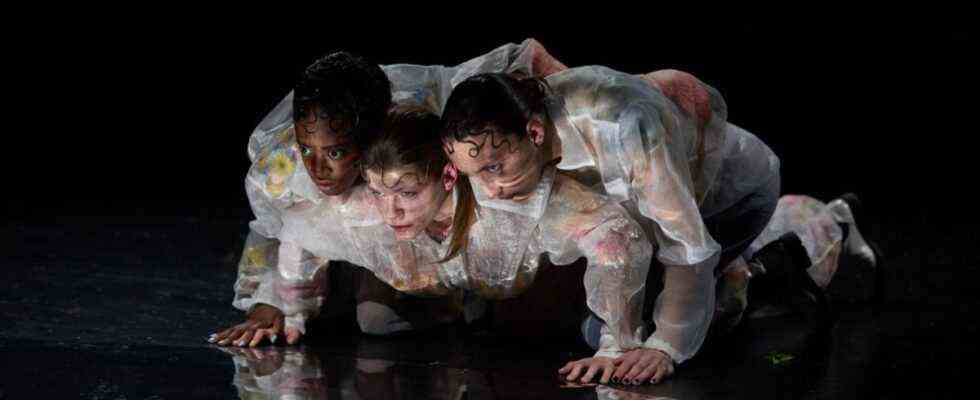Ophelia’s drowning and dying can be viewed aesthetically. In Shakespeare’s work she floats on the water, surrounded by her clothes, like a creature that belongs in this element. Arthur Rimbaud compares Ophelia with a lily, the wind billows the veil “like an umbel”. And then there are bursting blood vessels, putrefaction, putrefaction, gases that can be described. At least this is the case with “Ophelia – Exit Water” in the workshop of the Munich Kammerspiele so. Ophelia is allowed to rage, let her aggressions run free, long for her mom, not want to die. This performative examination of the most famous corpse of water in literature lasts 45 minutes, an evening that actually only shows the intermediate status of an artistic work, but comes along as a powerful miniature staging.
“Ophelia – Exit Water” is part of “Remote Neighbors Kyiv-Munich”, an artistic exchange initiated by the Kammerspiele between theater professionals from Munich and the Ukraine. It’s an exciting project that, on the one hand, points to the existing limits and differences, but on the other hand just blurs them. Just like in the Ophelia evening, which was supposed to have its premiere in Kiev, but was shown first at the Kammerspiele due to the Corona crisis. The actresses Edith Saldanha, Anastasiia Pustovit and Maryna Klimova and director Alek Niemiro, who came partly from Munich and partly from Kiev, had three weeks to find each other thematically and artistically. It must have happened very simply and trustingly, at least that is what it looks like on stage.
There is nothing dividing the stage
“Ophelia – Exit Water” begins with an intimate image: a ball of people in the middle of the stage, bodies delicately intertwined. There is nothing separating it on stage, you can feel it immediately. This also applies later in the game, when the language is not the same and the body language is also different. Confident, elegant, questioning on the one hand, combative, latently provocative on the other. The three actresses work together towards a moment, Ophelia, how she inevitably becomes a corpse in water. They found beautiful pictures for it in the workroom.
Martín Valdés-Stauber, Dramaturge at the Kammerspiele, curated the five-day small festival. Two premieres, a readings and several discussion panels are part of it, some of which can be seen as a stream. The mixture is a good success, as it allows a varied view of the “distant neighbors”. The young, artistic and lively scene in Ukraine, for example, is allowed to present itself here, even if only partly mediated in the discussions. It is a scene that is not necessarily associated with the conflict in eastern Ukraine and that urges to be perceived internationally.
The playwright Natalia Vorozhbyt deals with the conflict in eastern Ukraine
On the other hand, there is the artistic engagement with the conflict, the struggles in the east of the country. An important representative here is the playwright Natalia Vorozhbyt. In an interview with Valdés-Stauber, she was one of the first artists to travel to the crisis area and start working on it. In 2017 she wrote “Destroyed Streets” for the Royal Court Theater in London. She also filmed her play, the Ukrainian Oscar Committee nominated the film for the selection in 2022. In the Kammerspiele, Vorozhbyt reads the beginning of the drama in Ukrainian and German, alternating with actress Johanna Eiworth. It describes the journey of a woman named Natalia to Donbass, where she does research, experiences armed conflicts, falls in love with a soldier. She processed her own traumas in the play, says Vorozhbyt. These can be felt in the many short images of war that the author pairs with the shame of the first-person narrator, to have found her love precisely there, to experience feelings of happiness where unhappiness is omnipresent.
“What is Jewish Music?” with Svetlana Belesova and Alina Kostiukova is the second production of the festival that deals with the time of the Second World War.
(Photo: Judith Buss)
The second production of this festival is dedicated to another trauma: “What is Jewish Music?” The playwright Anastasiia Kosodii does memory work here, examines the history of the Second World War, looks at the time of the German occupation in Poland, the role of the Ukrainians in it and afterwards. This piece should also have had its premiere in Kiev, now it can first be seen with Svetlana Belesova and Alina Kostiukova in the Werkraum. Kosodii, who also directed, later said in conversation that she had not adapted the play for the Germans, that she could not and would not have explained all the places and conflicts. Some of what is being negotiated here is not familiar, but the conflicts and questions are familiar. Contrasts are blurred once again at this festival, which has opened up new, interesting perspectives on the strange neighbors.

